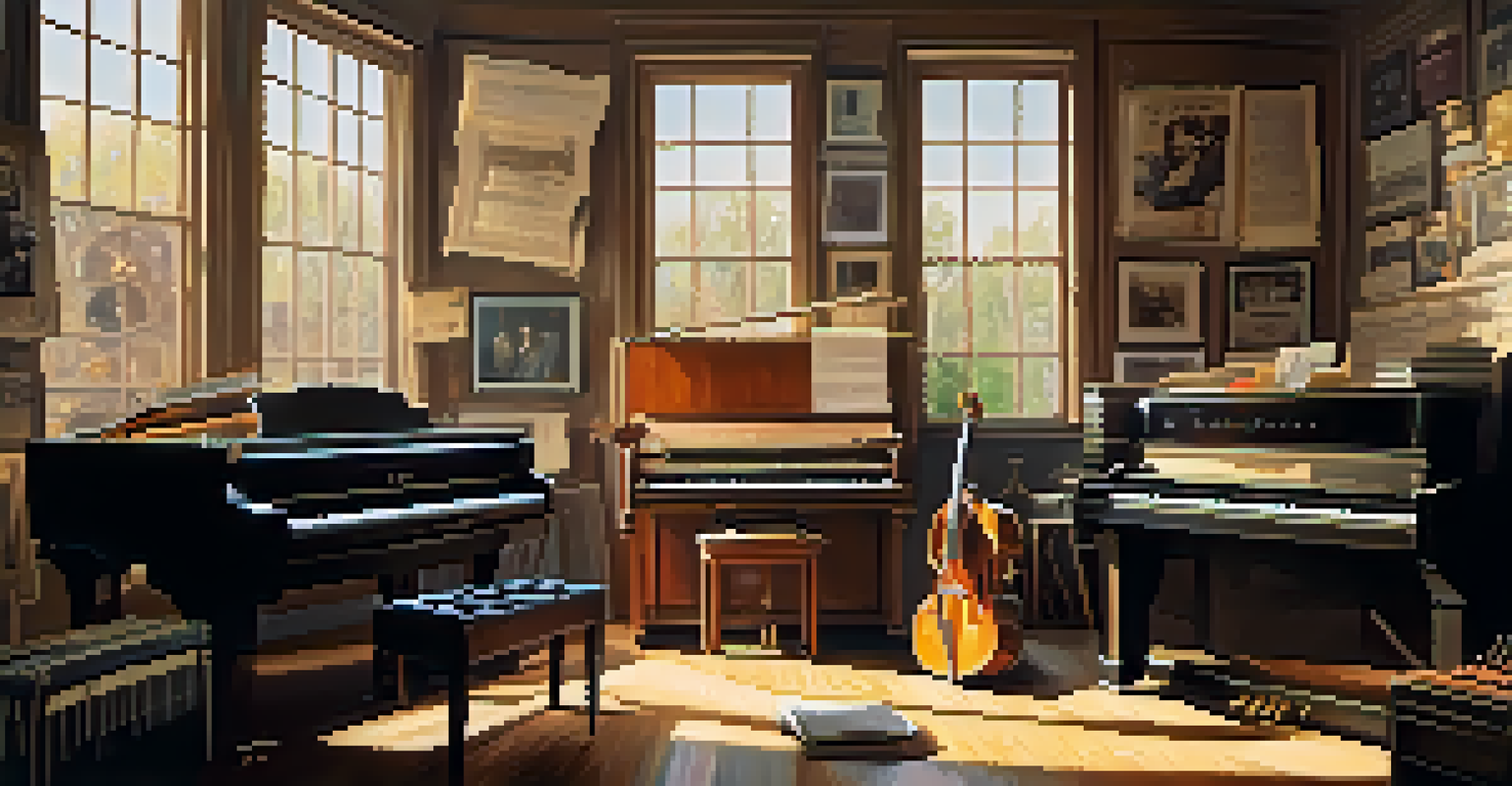The Nostalgia Factor: Music’s Power to Evoke Memories

The Science of Music and Memory Connection
Music has a unique ability to evoke strong memories, and this isn't just a coincidence. Research shows that the brain processes music in a way that intertwines it with emotional responses. When we hear a song from our past, it can transport us back to a specific moment in time, often accompanied by vivid emotions.
Music can change the world because it can change people.
This phenomenon occurs because music activates the brain's limbic system, which is responsible for emotions and memory. For example, hearing a favorite song from high school can trigger memories of friends, laughter, and even heartbreak. It's almost as if the melody serves as a time machine, taking us back to those cherished (or sometimes bittersweet) moments.
Moreover, the emotional weight of these memories can be profound. Studies have shown that people with Alzheimer's can recall long-forgotten memories when exposed to music from their youth. This connection between music and memory highlights the power of melodies to keep our past alive.
Nostalgia: A Comforting Emotion in Music
Nostalgia is a warm blanket of emotion, and music is often the fabric that weaves it together. When we listen to songs that remind us of our past, we may feel a sense of comfort and belonging. This emotional reaction can help us cope during tough times, providing solace through familiar tunes.

Think about the last time you heard a song that made you smile—chances are, it brought back memories of a happy time in your life. Whether it's a family road trip or a first dance, these memories can create a sense of connection to our roots. Music becomes a vessel for our shared experiences and emotions.
Music Evokes Strong Memories
Music activates the brain's emotional centers, allowing us to recall vivid memories tied to specific songs.
Additionally, nostalgia is not just a personal experience; it can be collective. When we share songs that evoke nostalgia with others, we strengthen our bonds. Singing along to an old hit at a reunion can unite people and rekindle friendships, reminding us of shared moments that shaped our lives.
The Role of Lyrics in Memory Recall
Lyrics can play a crucial role in how we remember songs and the memories associated with them. Often, the words of a song resonate deeply, telling stories that reflect our own experiences. When we hear those lyrics again, they can unlock a floodgate of memories tied to specific events or feelings.
Without music, life would be a mistake.
For instance, a breakup song might remind you of your own heartache, capturing the essence of the pain you felt. The combination of melody and lyrics creates a powerful emotional response, enhancing memory recall. It’s as if the song becomes the soundtrack to our lives, each lyric a brushstroke in the painting of our past.
Moreover, the narrative quality of lyrics can help us make sense of our emotions and experiences. Singing along or reminiscing about what those words meant at a particular time can provide clarity and understanding. This connection between lyrics and memory allows us to explore our personal journeys through the lens of music.
Music as a Time Capsule of Our Lives
Every playlist or mixtape we create serves as a time capsule, encapsulating specific moments in our lives. The songs we choose often reflect our feelings, relationships, and experiences during that period. When we revisit these collections, they can evoke a flood of memories that tell the story of who we are.
Consider how different genres can represent different stages of life—perhaps pop songs remind you of carefree teen years, while classic rock brings back college memories. Each song holds a piece of our history, and when we listen, we can relive those moments as if they were happening all over again.
Nostalgia Strengthens Bonds
Sharing nostalgic songs with others can create a sense of connection and rekindle relationships.
This nostalgic journey through music not only evokes memories but also helps us appreciate our growth. As we revisit these time capsules, we can reflect on how far we've come and the experiences that have shaped our identity. Music, then, becomes a bridge between our past and present.
Cultural Influence on Nostalgic Music Preferences
Cultural background plays a significant role in the music that evokes nostalgia for us. The songs we grew up listening to, often influenced by our families and communities, shape our emotional responses. For example, someone raised in a household that cherished classic jazz may feel nostalgic when they hear a familiar tune from that genre.
These cultural influences create a rich tapestry of memories, connecting us to our heritage. Music is often a reflection of the times and places we come from, and it can evoke feelings of pride and belonging. Songs can serve as a reminder of cultural traditions, celebrations, or even struggles.
Ultimately, the music we connect with can help us understand our identity and place in the world. By exploring these cultural influences, we not only tap into personal nostalgia but also celebrate the diverse musical landscape that shapes our memories.
The Evolution of Music and Its Impact on Nostalgia
As music evolves, so does our experience of nostalgia. Each generation has its anthems that encapsulate the essence of their time, and as new music emerges, it often draws from the past. This blending of styles creates a rich layer of nostalgia for both older and newer generations.
For instance, today's pop hits often sample or reinterpret classic songs, making them accessible to a new audience. These modern takes can evoke nostalgia even in listeners who may not have experienced the original music. It’s fascinating how music can transcend time, connecting different generations through familiar melodies.
Music Shapes Our Future Memories
The songs we listen to today will become the nostalgic anthems of our future experiences.
As we reminisce about songs from our youth, we also see how they influence contemporary music. This cyclical nature of music creates a sense of continuity, allowing us to revisit the emotions tied to past hits while appreciating new interpretations. Nostalgia, then, becomes a bridge between the old and the new, enriching our musical landscape.
Creating New Memories Through Music Today
While music has the power to evoke memories of the past, it also plays a vital role in creating new memories. Our experiences today, whether joyful or challenging, are often accompanied by soundtracks that help define them. The songs we listen to now can become the nostalgic anthems of our future.
Think about the last concert you attended or a road trip with friends filled with laughter and music. Those moments, coupled with the right tunes, form lasting memories that we will look back on fondly. Music has a way of cementing those experiences in our minds, allowing us to relive them again and again.

As we continue to navigate life, the music we discover and enjoy will shape our future nostalgic moments. Whether it’s a heartfelt ballad or an upbeat anthem, the songs of today will soon join the ranks of our cherished memories. In this way, music is not just a reflection of our past, but an active participant in crafting our future.